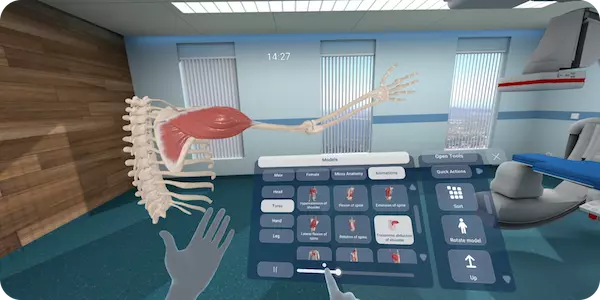Benefits of Metaverse for Healthcare
Posted on May 6, 2023 5 minutes 855 words
Table of contents
The Metaverse, an immersive virtual space that combines augmented, virtual, and mixed reality technologies, is at the forefront of digital transformation across numerous industries, including healthcare. As the next frontier in technology, the Metaverse has the potential to revolutionize medical training, diagnostics, therapy, patient engagement, and much more. In this blog post, we will explore the far-reaching benefits and implications of the Metaverse for healthcare and its role in shaping the future of medicine.
Advanced Virtual Training and Education
Traditional medical training has often been limited by the resources available for hands-on experiences and practical skills development. The Metaverse, with its cutting-edge simulations and virtual environments, allows medical professionals to access immersive training experiences beyond the constraints of physical locations. Some key advancements include:
Virtual Patients and Surgery Simulations
Trainees can practice complex procedures on virtual patients with realistic anatomical structures, allowing for countless repetitions and a risk-free learning environment. Surgery simulations enable students to develop their skills and learn from mistakes without the potential for real-life consequences.

3D Models and Haptic Feedback
Interactive 3D models of human anatomy and advanced haptic feedback systems provide a tactile experience that closely mimics real-world interactions. This level of immersion can lead to a deeper understanding of medical concepts and better retention of knowledge.
Continuing Education and Certification
Healthcare professionals can access virtual training modules and courses, staying up-to-date with the latest advancements in medicine and maintaining their certifications more easily.
Comprehensive Remote Diagnostics and Telemedicine
The Metaverse is poised to revolutionize healthcare delivery by offering comprehensive remote diagnostics and treatment options through telemedicine. Key developments include:
Virtual Consultation Rooms
Virtual consultation rooms enable healthcare providers to examine and treat patients using 3D imaging technologies and diagnostic tools, significantly reducing the need for in-person visits.
Wearable Devices and IoT Integration
The integration of wearable devices and the Internet of Things (IoT) allows for real-time monitoring of patients’ vital signs and health indicators, enabling medical professionals to make more informed decisions and provide personalized care.
Reducing Healthcare Disparities
Telemedicine can help bridge the gap for patients in remote or underserved areas, ensuring that quality healthcare is accessible to all, regardless of location.
Immersive Virtual Reality Therapy
Virtual reality (VR) therapy has emerged as an innovative treatment option for various mental health and rehabilitation purposes. The Metaverse provides personalized and immersive therapeutic environments for patients, offering several benefits:
Exposure Therapy for Anxiety and Phobias
VR therapy allows patients to confront their fears in a controlled environment, gradually acclimating to anxiety-inducing situations and learning to manage their emotions more effectively.
PTSD and Trauma Treatment
The Metaverse can provide a safe space for patients with PTSD and trauma to process their experiences, practice coping strategies, and work towards healing.
Physical Rehabilitation
VR therapy can be used to create customized rehabilitation programs for patients recovering from injuries or surgeries, helping them rebuild motor skills and improve mobility.
Enhanced Patient Engagement and Experience
The Metaverse offers numerous opportunities for improving patient engagement and overall healthcare experiences:
Personalized Health Information and Resources
Patients can access virtual health clinics, educational modules, and interactive wellness programs, fostering greater involvement in their healthcare journey.
Virtual Support Groups and Communities
The Metaverse can connect patients with similar health conditions, creating virtual support groups and communities where individuals can share experiences, exchange advice, and find emotional support.
Gamification of Health and Wellness
Incorporating gamification elements into health and wellness programs can motivate patients to achieve their goals, making the process more engaging and enjoyable. Examples of gamification include rewards systems, progress tracking, and competition elements that encourage patients to take an active role in their own health management.
Streamlined Collaboration and Knowledge Sharing
The Metaverse fosters global collaboration and knowledge sharing among healthcare professionals, researchers, and institutions, accelerating medical advancements and innovation:
Virtual Conferences and Workshops
Healthcare professionals can attend virtual conferences, workshops, and seminars, eliminating geographical barriers and reducing costs associated with travel. This increased accessibility enables a wider range of professionals to learn from one another and stay updated on the latest research and treatments.
Real-time Collaboration
Virtual workspaces and meeting rooms in the Metaverse enable real-time collaboration on research projects and patient cases. This instant connectivity can lead to more efficient problem-solving, improved patient outcomes, and faster development of new treatments.
Shared Virtual Libraries and Databases
The Metaverse allows for the creation of shared virtual libraries and databases, making it easier for healthcare professionals to access and contribute to a vast pool of knowledge. This open exchange of information can drive innovation and facilitate evidence-based decision-making.
Conclusion
As the Metaverse continues to evolve and integrate with healthcare, it holds immense potential for revolutionizing the way we learn, diagnose, treat, and engage with patients. From advanced virtual training and remote diagnostics to immersive therapy experiences and enhanced patient engagement, the Metaverse will play an increasingly significant role in shaping the future of medicine. It is crucial for healthcare professionals, institutions, and patients to embrace these technological advancements and stay informed about the ongoing developments in the Metaverse to ensure the best possible outcomes for all.








